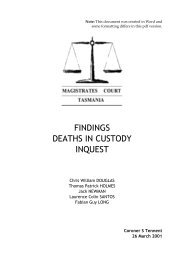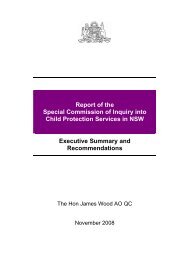Psychological Science in the Public Interest - Williams College
Psychological Science in the Public Interest - Williams College
Psychological Science in the Public Interest - Williams College
You also want an ePaper? Increase the reach of your titles
YUMPU automatically turns print PDFs into web optimized ePapers that Google loves.
PSYCHOLOGICAL SCIENCE IN THE PUBLIC INTEREST<br />
The Psychology of Confessions<br />
A Review of <strong>the</strong> Literature and Issues<br />
Saul M. Kass<strong>in</strong> 1 and Gisli H. Gudjonsson 2<br />
1 Department of Psychology, <strong>Williams</strong> <strong>College</strong>, and 2 Institute of Psychiatry, K<strong>in</strong>g’s <strong>College</strong>, London, United K<strong>in</strong>gdom<br />
SUMMARY—Recently, <strong>in</strong> a number of high-profile cases,<br />
defendants who were prosecuted, convicted, and sentenced<br />
on <strong>the</strong> basis of false confessions have been exonerated<br />
through DNA evidence. As a historical matter,<br />
confession has played a prom<strong>in</strong>ent role <strong>in</strong> religion, <strong>in</strong><br />
psycho<strong>the</strong>rapy, and <strong>in</strong> crim<strong>in</strong>al law—where it is a prosecutor’s<br />
most potent weapon. In recent years, psychologists<br />
from <strong>the</strong> cl<strong>in</strong>ical, personality, developmental,<br />
cognitive, and social areas have brought <strong>the</strong>ir <strong>the</strong>ories and<br />
research methods to bear on an analysis of confession<br />
evidence, how it is obta<strong>in</strong>ed, and what impact it has on<br />
judges, juries, and o<strong>the</strong>r people.<br />
Draw<strong>in</strong>g on <strong>in</strong>dividual case studies, archival reports,<br />
correlational studies, and laboratory and field experiments,<br />
this monograph scrut<strong>in</strong>izes a sequence of events<br />
dur<strong>in</strong>g which confessions may be obta<strong>in</strong>ed from crim<strong>in</strong>al<br />
suspects and used as evidence. First, we exam<strong>in</strong>e <strong>the</strong><br />
pre<strong>in</strong>terrogation <strong>in</strong>terview, a process by which police target<br />
potential suspects for <strong>in</strong>terrogation by mak<strong>in</strong>g demeanor-based<br />
judgments of whe<strong>the</strong>r <strong>the</strong>y are be<strong>in</strong>g<br />
truthful. Consistent with <strong>the</strong> literature show<strong>in</strong>g that people<br />
are poor lie detectors, research suggests that tra<strong>in</strong>ed and<br />
experienced police <strong>in</strong>vestigators are prone to see deception<br />
at this stage and to make false-positive errors, disbeliev<strong>in</strong>g<br />
people who are <strong>in</strong>nocent, with a great deal of confidence.<br />
Second, we exam<strong>in</strong>e <strong>the</strong> Miranda warn<strong>in</strong>g and waiver, a<br />
process by which police apprise suspects of <strong>the</strong>ir constitutional<br />
rights to silence and to counsel. This important<br />
procedural safeguard is <strong>in</strong> place to protect <strong>the</strong> accused,<br />
but researchers have identified reasons why it may have<br />
little impact. One reason is that some suspects do not have<br />
<strong>the</strong> capacity to understand and apply <strong>the</strong>se rights. Ano<strong>the</strong>r<br />
is that police have developed methods of obta<strong>in</strong><strong>in</strong>g waivers.<br />
Indeed, <strong>in</strong>nocent people <strong>in</strong> particular tend to waive <strong>the</strong>ir<br />
Address correspondence to Saul Kass<strong>in</strong>, Department of Psychology,<br />
<strong>Williams</strong> <strong>College</strong>, <strong>Williams</strong>town, MA 01267; e-mail: skass<strong>in</strong>@<br />
williams.edu.<br />
rights, naively believ<strong>in</strong>g that <strong>the</strong>y have noth<strong>in</strong>g to fear or<br />
hide and that <strong>the</strong>ir <strong>in</strong>nocence will set <strong>the</strong>m free.<br />
Third, we exam<strong>in</strong>e <strong>the</strong> modern police <strong>in</strong>terrogation, a<br />
guilt-presumptive process of social <strong>in</strong>fluence dur<strong>in</strong>g which<br />
tra<strong>in</strong>ed police use strong, psychologically oriented techniques<br />
<strong>in</strong>volv<strong>in</strong>g isolation, confrontation, and m<strong>in</strong>imization<br />
of blame to elicit confessions. Fourth, we exam<strong>in</strong>e <strong>the</strong><br />
confession itself, discuss<strong>in</strong>g <strong>the</strong>oretical perspectives and<br />
research on why people confess dur<strong>in</strong>g <strong>in</strong>terrogation. In<br />
particular, we focus on <strong>the</strong> problem of false confessions<br />
and <strong>the</strong>ir corrupt<strong>in</strong>g <strong>in</strong>fluence <strong>in</strong> cases of wrongful convictions.<br />
We dist<strong>in</strong>guish among voluntary, compliant, and<br />
<strong>in</strong>ternalized false confessions. We describe personal risk<br />
factors for susceptibility to false confessions, such as<br />
dispositional tendencies toward compliance and suggestibility,<br />
youth, mental retardation, and psychopathology.<br />
We <strong>the</strong>n exam<strong>in</strong>e situational factors related to <strong>the</strong> processes<br />
of <strong>in</strong>terrogation and show that three common <strong>in</strong>terrogation<br />
tactics—isolation; <strong>the</strong> presentation of false<br />
<strong>in</strong>crim<strong>in</strong>at<strong>in</strong>g evidence; and m<strong>in</strong>imization, which implies<br />
leniency will follow—can substantially <strong>in</strong>crease <strong>the</strong> risk<br />
that ord<strong>in</strong>ary people will confess to crimes <strong>the</strong>y did not<br />
commit, sometimes <strong>in</strong>ternaliz<strong>in</strong>g <strong>the</strong> belief <strong>in</strong> <strong>the</strong>ir own<br />
culpability.<br />
Fifth, we exam<strong>in</strong>e <strong>the</strong> consequences of confession evidence<br />
as evaluated by police and prosecutors, followed by<br />
judges and juries <strong>in</strong> court. Research shows that confession<br />
evidence is <strong>in</strong>herently prejudicial, that juries are <strong>in</strong>fluenced<br />
by confessions despite evidence of coercion and despite<br />
a lack of corroboration, and that <strong>the</strong> assumption that<br />
‘‘I’d know a false confession if I saw one’’ is an unsubstantiated<br />
myth. F<strong>in</strong>ally, we address <strong>the</strong> role of psychologists<br />
as expert witnesses and suggest a number of possible<br />
safeguards. In particular, we argue that <strong>the</strong>re is<br />
a need to reform <strong>in</strong>terrogation practices that <strong>in</strong>crease<br />
<strong>the</strong> risk of false confessions and recommend a policy of<br />
mandatory videotap<strong>in</strong>g of all <strong>in</strong>terviews and <strong>in</strong>terrogations.<br />
Volume 5—Number 2 Copyright r 2004 American <strong>Psychological</strong> Society<br />
33


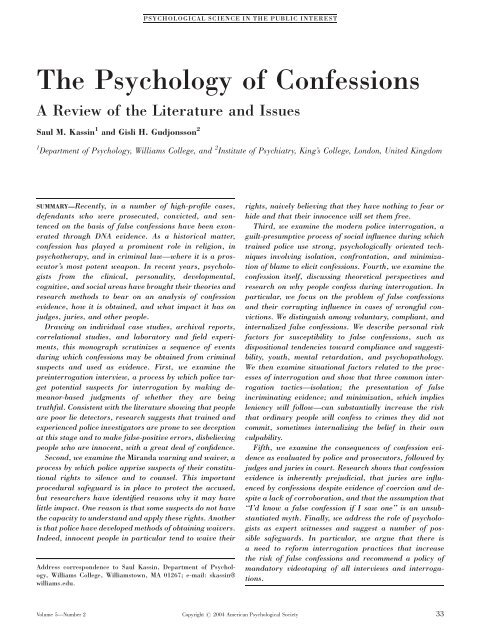
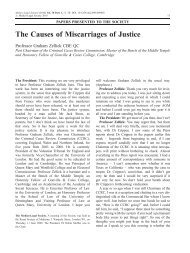
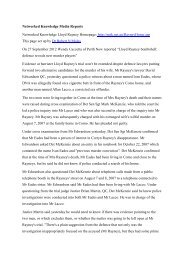
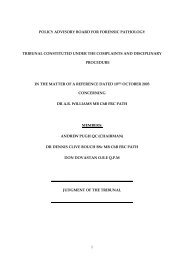
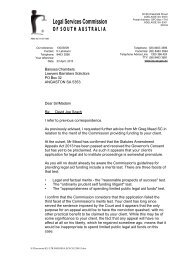
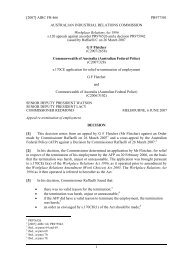
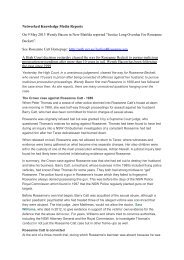
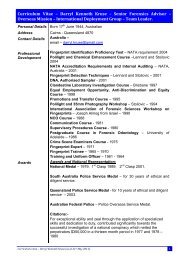
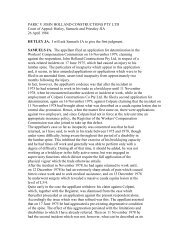
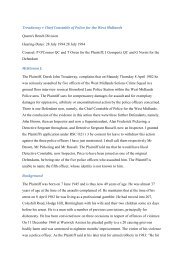
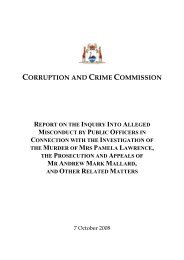
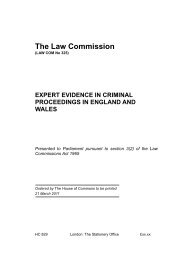

![R v Gilham [2012] NSWCCA 132 - verdicts of acquittal](https://img.yumpu.com/40383571/1/184x260/r-v-gilham-2012-nswcca-132-verdicts-of-acquittal.jpg?quality=85)
